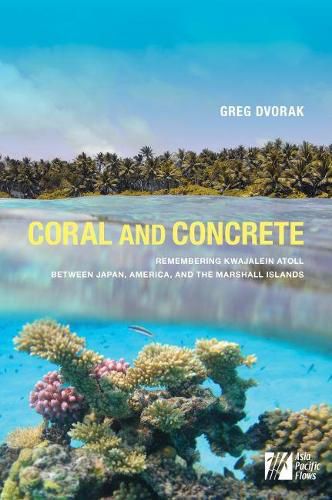Readings Newsletter
Become a Readings Member to make your shopping experience even easier.
Sign in or sign up for free!
You’re not far away from qualifying for FREE standard shipping within Australia
You’ve qualified for FREE standard shipping within Australia
The cart is loading…






Coral and Concrete, Greg Dvorak’s cross-cultural history of Kwajalein Atoll, Marshall Islands, explores intersections of environment, identity, empire, and memory in the largest inhabited coral atoll on earth. Approaching the multiple atollscapes of Kwajalein’s past and present as Marshallese ancestral land, Japanese colonial outpost, Pacific War battlefield, American weapons-testing base, and an enduring home for many, Dvorak delves into personal narratives and collective mythologies from contradictory vantage points. He navigates the tensions between little stories of ordinary human actors and big stories of global politics - drawing upon the little metaphor of the coral organisms that colonize and build atolls, and the big metaphor of the all-encompassing concrete that buries and co-opts the past.Building upon the growing body of literature about militarism and decolonization in Oceania, this book advocates a layered, nuanced approach that emphasizes the multiplicity and contradictions of Pacific Islands histories as an antidote to American hegemony and globalization within and beyond the region. It also brings Japanese, Korean, Okinawan, and American perspectives into conversation with Micronesians’ recollections of colonialism and war. This transnational history - built upon a combination of reflective personal narrative, ethnography, cultural studies, and postcolonial studies - thus resituates Kwajalein Atoll as a pivotal site where Islanders have not only thrived for thousands of years, but also mediated between East and West, shaping crucial world events.
Based on multi-sited ethnographic and archival research, as well as Dvorak’s own experiences growing up between Kwajalein, the United States, and Japan, Coral and Concrete integrates narrative and imagery with semiotic analysis of photographs, maps, films, and music, traversing colonial tropical fantasies, tales of victory and defeat, missile testing, fisheries, war-bereavement rituals, and landowner resistance movements, from the twentieth century through the present day. Representing history as a perennial struggle between coral and concrete, the book offers an Oceanian paradigm for decolonization, resistance, solidarity, and optimism that should appeal to all readers far beyond the Marshall Islands.
$9.00 standard shipping within Australia
FREE standard shipping within Australia for orders over $100.00
Express & International shipping calculated at checkout
Coral and Concrete, Greg Dvorak’s cross-cultural history of Kwajalein Atoll, Marshall Islands, explores intersections of environment, identity, empire, and memory in the largest inhabited coral atoll on earth. Approaching the multiple atollscapes of Kwajalein’s past and present as Marshallese ancestral land, Japanese colonial outpost, Pacific War battlefield, American weapons-testing base, and an enduring home for many, Dvorak delves into personal narratives and collective mythologies from contradictory vantage points. He navigates the tensions between little stories of ordinary human actors and big stories of global politics - drawing upon the little metaphor of the coral organisms that colonize and build atolls, and the big metaphor of the all-encompassing concrete that buries and co-opts the past.Building upon the growing body of literature about militarism and decolonization in Oceania, this book advocates a layered, nuanced approach that emphasizes the multiplicity and contradictions of Pacific Islands histories as an antidote to American hegemony and globalization within and beyond the region. It also brings Japanese, Korean, Okinawan, and American perspectives into conversation with Micronesians’ recollections of colonialism and war. This transnational history - built upon a combination of reflective personal narrative, ethnography, cultural studies, and postcolonial studies - thus resituates Kwajalein Atoll as a pivotal site where Islanders have not only thrived for thousands of years, but also mediated between East and West, shaping crucial world events.
Based on multi-sited ethnographic and archival research, as well as Dvorak’s own experiences growing up between Kwajalein, the United States, and Japan, Coral and Concrete integrates narrative and imagery with semiotic analysis of photographs, maps, films, and music, traversing colonial tropical fantasies, tales of victory and defeat, missile testing, fisheries, war-bereavement rituals, and landowner resistance movements, from the twentieth century through the present day. Representing history as a perennial struggle between coral and concrete, the book offers an Oceanian paradigm for decolonization, resistance, solidarity, and optimism that should appeal to all readers far beyond the Marshall Islands.